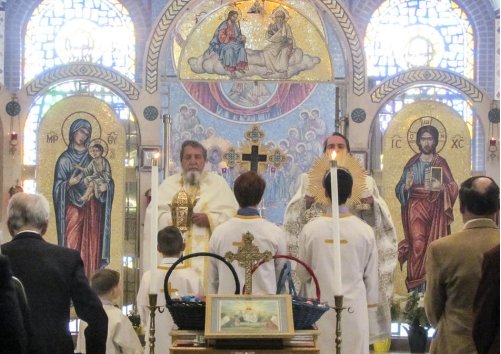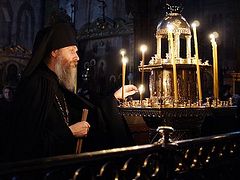Source: The Herald-News
March 9, 2016
Just a very quiet time.
That’s how Rebecca Grabavoy, 57, of Darien, and a lifelong member of St. Nicholas Orthodox Church in Joliet, describes the Great Fast, commonly known as Lent.
Lent in the Orthodox church is not simply refraining from certain foods, Grabavoy said, but exchanging distractions, such as parties, television and the radio, for an increase in spiritual reading, church services and charitable works, discreetly performed.
The focus is not on the acts themselves, but the celebration of Jesus’ resurrection, known as Easter in the western Christian churches and Pascha in the eastern ones, Grabavoy said.
“You look forward to it,” Grabavoy said. “It’s a cleansing period that makes Pascha more meaningful. It’s a journey every year and we travel through it. Pascha is the holiest of all holy days. This is what we live and believe and look forward to. It’s the center of our church life and Lent is preparation for it.”
For Eastern Orthodox Christians, Lent begins March 14 this year. The discrepancy in the starting date compared with Catholic and Protestant churches is due to the calendar used to calculate the date of Easter, said the Rev. Nikolaj Kostur, pastor of St. George Serbian Orthodox Church in Joliet.
According to the Diocese of Joliet, the First Ecumenical Council of Nicea in 325 decreed Easter would be celebrated the first Sunday after the first full moon of spring.
Western Christians, which include the Catholic and Protestant churches, use the newer Gregorian calendar to determine the date of Easter. The Orthodox Christians use the older Julian calendar, Kostur said.
Intense abstinence
Ash Wednesday doesn’t exist in the Orthodox church and fasting goes beyond not eating meat on Fridays. Traditional fasting guidelines in the Orthodox church include no meat, eggs, dairy products and – in some cases – even fish (as it’s considered “fleshy”) from the beginning of the Great Fast until Pascha, Kostur said.
“By abstaining from certain physical foods, our being is lighter, so to speak,” Kostur said. “And that allows our soul to be lighter, too.”
Kostur recalled his first week of Great Fast as a seminarian. Church services occupied most of the day and lunch was light: boiled potatoes, along with tea and a slice of bread with honey.
“By the end of the first day, you’re hungry. By the end of the second day, you’re getting used to it,” Kostur said. “By the third day, your thinking clears and you’re looking at your spiritual life more in-depth and concentrating on what’s important.”
Fasting precepts are guidelines, not strict rules, Kostur said. That’s especially true for the elderly, the sick, pregnant women and young children – although children are generally eager to follow their parents’ lead, he added.
In the Orthodox church, the Lenten season is also longer than in the Western church. It’s preceded by three weeks of preparation, Kostur said, and ends at the start of Holy Week. Dairy foods disappear from the diet the week before Lent actually begins, he added.
Unique services and traditions
Instead of Stations of the Cross, the Liturgy of the Presanctified Gifts is typically celebrated on Wednesday and Friday evenings, Kostur said. This service includes Communion that was consecrated the previous Sunday. Like Catholics, the Orthodox believe the bread and wine are the actual body and blood of Jesus.
“It’s not a hard burden,” Kostur said of fasting and of Lent. “It’s actually a joyful time.”
The Rev. Stephen Bithos, pastor at All Saints Greek Orthodox Church in Joliet, said his church offers a compline service Monday, Liturgy of the Presanctified Gifts on Wednesday and an acathist (hymn of praise) to the Theotokos (Greek for mother of God).
Then on Palm Sunday, Bithos said, the Greek church distributes bay leaves in addition to palms because the crowds laid both on the ground when Jesus entered Jerusalem, according to Greek translations.
“They use pussy willows in Russia,” Bithos said, “because in Russia, there aren’t palms or bay leaves.”
For all its traditions, Lent is ultimately an opportunity for reflection – on our lives, our spirituality, Christ’s passion and resurrection – and renewed encouragement to take up our own cross and walk in Jesus’ footsteps, Bithos said.
“It brings meaning to our faith, it brings meaning to our lives,” Bithos said, “and instills a moral and ethical code within us.”
Diane Troy of Plainfield, a 35-year member of All Saints, converted to Orthodoxy shortly after her marriage. Because Troy belongs to the church’s choir, she spends much of Lent practicing the music for Holy Week services.
For Troy, the fasting, the music, the Lenten services and the Biblical readings the Orthodox prescribe are signposts to Christ’s crucifixion and resurrection, the foundation of Christianity, she said.
“It just gives you a good feeling about why you’re a Christian,” Troy said.




